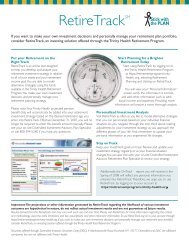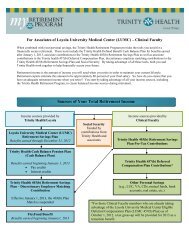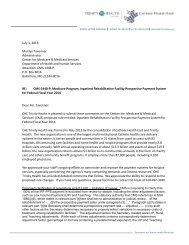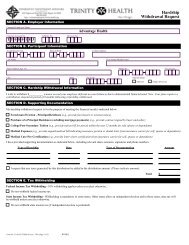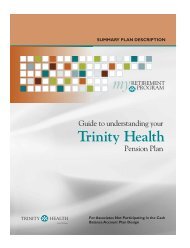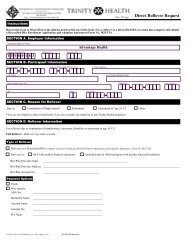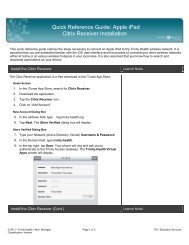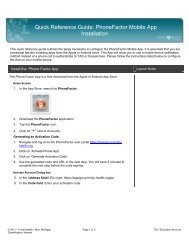Standards of Conduct - Trinity Health
Standards of Conduct - Trinity Health
Standards of Conduct - Trinity Health
Create successful ePaper yourself
Turn your PDF publications into a flip-book with our unique Google optimized e-Paper software.
<strong>Trinity</strong> <strong>Health</strong><br />
<strong>Standards</strong><br />
OF CONDUCT<br />
ORGANIZATIONAL INTEGRITY PROGRAM • SUPPORTING RIGHT RELATIONSHIPS<br />
But as for me,<br />
I will walk in my integrity.<br />
PSALM 26:11
Table <strong>of</strong> Contents<br />
Introduction . . . . . . . . . . . . . . . . . . . . . . . . . . . . . . . . . . . . . . . . . . . . . . . . . . . . . . . . . 2<br />
• Why the <strong>Standards</strong> <strong>of</strong> <strong>Conduct</strong> are Important . . . . . . . . . . . . . . . . . . . . . . . . . . . . . . . 2<br />
• Our Responsibilities. . . . . . . . . . . . . . . . . . . . . . . . . . . . . . . . . . . . . . . . . . . . . . . . . . . . 2<br />
• Responsibilities <strong>of</strong> Leaders . . . . . . . . . . . . . . . . . . . . . . . . . . . . . . . . . . . . . . . . . . . . . . . . . . . . . . . . . 2<br />
<strong>Standards</strong> <strong>of</strong> <strong>Conduct</strong>: Supporting Right Relationships . . . . . . . . . . . . . . . 4<br />
• My Relationships With Patients, Their Families and Others We Serve . . . . . . . . . . . . 4<br />
• My Relationships With My Coworkers and Others Who Serve With Me . . . . . . . . . . . 6<br />
• My Relationships With Vendors, Other Business Partners, and Competitors . . . . . . . . . . .8<br />
• My Relationships With the Government and Other Payers . . . . . . . . . . . . . . . . . . . . . 10<br />
• My Relationships With <strong>Trinity</strong> <strong>Health</strong> and the Communities We Serve . . .. . . . . . . . . . . . .14<br />
Where to Find Help . . . . . . . . . . . . . . . . . . . . . . . . . . . . . . . . . . . . . . . . . . . . . . . . . 16<br />
• Resources . . . . . . . . . . . . . . . . . . . . . . . . . . . . . . . . . . . . . . . . . . . . . . . . . . . . . . . . . . . 16<br />
• Non-Retaliation Policy . . . . . . . . . . . . . . . . . . . . . . . . . . . . . . . . . . . . . . . . . . . . . . . . . 17<br />
Mission<br />
We serve together in <strong>Trinity</strong> <strong>Health</strong>,<br />
in the spirit <strong>of</strong> the Gospel,<br />
to heal body, mind and spirit,<br />
to improve the health <strong>of</strong> our communities<br />
and to steward the resources entrusted to us.<br />
Core Values<br />
• Respect<br />
• Social Justice<br />
• Compassion<br />
• Care <strong>of</strong> the Poor and Underserved<br />
• Excellence<br />
Guiding Behaviors<br />
• We support each other in serving our patients and communities<br />
• We communicate openly, honestly, respectfully and directly<br />
• We are fully present<br />
• We are all accountable<br />
• We trust and assume goodness in intentions<br />
• We are continuous learners
A MESSAGE<br />
From Our Leadership<br />
<strong>Trinity</strong> <strong>Health</strong> was established on a foundation <strong>of</strong> faith-based principles: Respect, Social Justice, Compassion,<br />
Care <strong>of</strong> the Poor and Underserved, and Excellence. These principles and the Mission serve as a compass to<br />
guide our ongoing health care ministry.<br />
We understand that working in the health care industry is extremely challenging, and sometimes the right<br />
course <strong>of</strong> action can be unclear. The <strong>Standards</strong> <strong>of</strong> <strong>Conduct</strong> are intended to help you respond to common<br />
questions and issues you may encounter in your daily work. The <strong>Standards</strong> are designed to help support<br />
“Right Relationships” – relationships with patients and others in our care, relationships with our coworkers<br />
and business partners, relationships with the government and others who pay for the health care services we<br />
provide, and relationships with our organization and communities.<br />
The <strong>Standards</strong> describe the behaviors and conduct expected <strong>of</strong> all <strong>Trinity</strong> <strong>Health</strong> associates, volunteers, medical<br />
staff and board members. To further apply the <strong>Standards</strong> to common situations encountered in the workplace,<br />
we have included actual questions posed by associates, physicians and others, along with answers.<br />
Please review and become familiar with the <strong>Standards</strong> <strong>of</strong> <strong>Conduct</strong>, particularly those areas that apply to your<br />
everyday work activities. When faced with a diffi cult decision or uncertainty, you should ask questions and seek<br />
advice from your supervisor or other appropriate resource. Most important, you’re responsible for speaking<br />
up about behaviors or actions that may be inconsistent with the <strong>Standards</strong> <strong>of</strong> <strong>Conduct</strong>. If you have a question<br />
or concern that is not specifi cally addressed by the <strong>Standards</strong>, please consult one <strong>of</strong> the many resources listed<br />
herein for assistance.<br />
Our health care ministry began more than 150 years ago through the work <strong>of</strong> our founding religious<br />
congregations– the Sisters <strong>of</strong> Mercy <strong>of</strong> the Americas, Regional Community <strong>of</strong> Detroit and the<br />
Congregation <strong>of</strong> the Sisters <strong>of</strong> the Holy Cross. Our sponsor today, Catholic <strong>Health</strong> Ministries, calls us to<br />
continue the ministry based on our Mission, Core Values and Guiding Behaviors. Acting with integrity and<br />
making decisions based on the highest standards <strong>of</strong> ethical behavior are critical to maintaining the longestablished<br />
and well-deserved reputation we’ve achieved in our communitities and within the health<br />
care industry.<br />
Thank you for joining us in our shared commitment to be leaders in the delivery <strong>of</strong> high-quality, safe and<br />
effective health care services in our communities, and in transforming the delivery <strong>of</strong> health care in the<br />
United States.<br />
Michael R. Holper<br />
Senior Vice President,<br />
Organizational Integrity and Audit Services,<br />
System Integrity Offi cer<br />
<strong>Trinity</strong> <strong>Health</strong><br />
1
WHY THE STANDARDS<br />
OF CONDUCT ARE IMPORTANT<br />
<strong>Trinity</strong> <strong>Health</strong> and each <strong>of</strong> us individually are held accountable<br />
for our behaviors and actions. In addition to supporting our<br />
Mission and Core Values, the <strong>Standards</strong> <strong>of</strong> <strong>Conduct</strong> also assist in<br />
ensuring that our actions and behaviors are consistent with the<br />
numerous legal, ethical and pr<strong>of</strong>essional obligations that apply to<br />
our health system ministry. Actions and behaviors that are<br />
inconsistent with the <strong>Standards</strong> <strong>of</strong> <strong>Conduct</strong> can significantly<br />
harm relationships with patients, communities, business partners<br />
and others we rely upon to assist us in the delivery <strong>of</strong> health<br />
care services.<br />
Individuals will be held accountable for actions and behaviors<br />
inconsistent with the <strong>Standards</strong> <strong>of</strong> <strong>Conduct</strong>. Violations could<br />
result in disciplinary action, up to and including termination<br />
<strong>of</strong> employment, suspension <strong>of</strong> medical staff privileges, or<br />
termination <strong>of</strong> business relationships, as applicable, in<br />
accordance with <strong>Trinity</strong> <strong>Health</strong>’s policies.<br />
Our Responsibilities<br />
The <strong>Standards</strong> <strong>of</strong> <strong>Conduct</strong> apply to all associates, contract<br />
workers, volunteers, medical staff members, and board members<br />
<strong>of</strong> <strong>Trinity</strong> <strong>Health</strong>.<br />
You have a responsibility to:<br />
• Review and follow the <strong>Standards</strong> <strong>of</strong> <strong>Conduct</strong>, paying<br />
particular attention to those areas that apply to your<br />
every day work activities.<br />
• Ask questions when you’re uncertain what to do.<br />
See page16 “Where to Find Help” for a listing <strong>of</strong> resources<br />
available to answer questions.<br />
• Speak up when you’re concerned about behavior that is<br />
inconsistent with the <strong>Standards</strong> <strong>of</strong> <strong>Conduct</strong>. See page16<br />
for a list <strong>of</strong> resources that can also be used to address<br />
your concerns.<br />
Responsibilities <strong>of</strong> Leaders<br />
Leaders in <strong>Trinity</strong> <strong>Health</strong>, including managers, supervisors, medical<br />
staff leaders, program directors, senior executives, and board<br />
members, are held to a higher standard <strong>of</strong> responsibility. As a<br />
leader, you serve a key role in receiving and responding to questions<br />
and concerns raised by associates and others you lead.<br />
How you respond to questions and concerns posed to you is<br />
key to others having the trust and confidence to bring important<br />
matters to your attention.<br />
As a <strong>Trinity</strong> <strong>Health</strong> leader, you have a responsibility to:<br />
• Serve as a role model for our Mission and Core Values by<br />
carrying-out your responsibilities with the highest degree<br />
<strong>of</strong> personal integrity.<br />
• Clearly communicate to others your expectations for the<br />
highest standards <strong>of</strong> ethical behavior.<br />
• Promote a culture <strong>of</strong> trust, open communication and<br />
respect.<br />
• Hold those you lead accountable for behavior inconsistent<br />
with our Mission and Core Values, and the <strong>Standards</strong> <strong>of</strong><br />
<strong>Conduct</strong>.<br />
• Encourage others to raise issues and concerns so they can<br />
appropriately be addressed.<br />
• Respond timely and appropriately to issues and concerns<br />
when they are brought to your attention.<br />
• Support and reinforce our Values through the use <strong>of</strong> the<br />
Mission Discernment Process and <strong>Trinity</strong> <strong>Health</strong> Values-<br />
Based Decision Making Process.<br />
• Support and promote <strong>Trinity</strong> <strong>Health</strong>’s policy <strong>of</strong> nonretaliation<br />
against anyone who raises issues and concerns<br />
in good faith.<br />
• Learn and follow applicable laws and regulations that affect<br />
business activities with physicians or other organizations<br />
who refer patients to <strong>Trinity</strong> <strong>Health</strong> facilities. See page 10<br />
for further information.<br />
• Ask for assistance when you’re unsure how to respond to<br />
an issue or concern. See page 16, “Where to Find Help,”<br />
for a list <strong>of</strong> resources.<br />
<strong>Trinity</strong> <strong>Health</strong> and our founding health systems have served the<br />
health care needs <strong>of</strong> communities for nearly 150 years. Your<br />
actions as a leader are critical to upholding the long-established<br />
reputation <strong>of</strong> <strong>Trinity</strong> <strong>Health</strong>.<br />
2 Integrity Line: 866-477-4661
Mission Discernment Process:<br />
A reflective process intended to ensure the Mission and Core Values are included in all major decisions.<br />
FAQ<br />
FREQUENTLY ASKED QUESTIONS<br />
Q: I have an associate who was disciplined for violating one <strong>of</strong><br />
our policies.The associate was reported by one <strong>of</strong> his coworkers<br />
and he is now treating that coworker very badly.<br />
What should I do?<br />
A: Reporting a policy violation in good faith is an expectation<br />
<strong>of</strong> all our associates. Retaliating against the person who reports<br />
such issues is strictly prohibited. This incident clearly needs to be<br />
addressed according to existing human resources procedures in<br />
your organization.<br />
—————————————————————————<br />
Q: A manager I work with is notorious for not returning<br />
messages in a timely manner. It has hindered our ability to get<br />
the job done. What should I do?<br />
A: Timely response is an expectation <strong>of</strong> leaders in our<br />
organization. Discuss the issue with the manager and let him or<br />
her know what you observe and how it is impacting your work<br />
together. You may be able to <strong>of</strong>fer some tips for time management<br />
that have been successful for you. If the behavior continues,<br />
or you have approached the manager in the past with no behavior<br />
change, contact a higher-level manager.<br />
—————————————————————————<br />
Q: One <strong>of</strong> my associates has reported an issue to me, but<br />
he doesn’t want to tell me who is involved because he doesn’t<br />
want the person to get in trouble. What should I do?<br />
A: Promoting a culture <strong>of</strong> trust is critical to our organization.<br />
Thank the associate for bringing the issue to your attention. Let<br />
the associate know that you understand and appreciate the concern<br />
for his or her coworker, but that it is important to follow up<br />
with the associate involved to address the issue and to prevent it<br />
from happening in the future.<br />
<strong>Trinity</strong> <strong>Health</strong> Values-Based Decision Making Process:<br />
A process intended for use in day-to-day operations when an<br />
individual, team or department is met with an issue or situation<br />
where:<br />
• There seems to be no single “best” response<br />
• There is a recognized “difference <strong>of</strong> opinion”<br />
• People don’t feel good about the circumstances<br />
or the possible resolution<br />
Consult your organization’s Mission/Ethics Office if you have<br />
questions or need further guidance.<br />
The Mission Discernment Process is to be used whenever<br />
<strong>Trinity</strong> <strong>Health</strong> or its Ministry Organizations are confronted<br />
with a significant decision that:<br />
• Might alter or appear to affect the Catholic identity <strong>of</strong> an entity<br />
• Might positively or negatively impact the Mission <strong>of</strong> the<br />
organization<br />
• Would significantly affect the status <strong>of</strong> groups <strong>of</strong> associates<br />
• Would affect local communities, vulnerable populations or the<br />
environment<br />
The Mission Discernment Process should be used for:<br />
• All mergers, acquisitions or major partnerships<br />
• Selected major capital requests<br />
• Addition or deletion <strong>of</strong> a major service line<br />
<strong>Trinity</strong> <strong>Health</strong> promotes a Just Culture that recognizes:<br />
• Associates should not be held accountable for system failings that<br />
they can’t control.<br />
• Associates are responsible for the quality <strong>of</strong> the choices they make,<br />
and for reporting errors and system problems.<br />
• Everyone makes mistakes, and people drift into bad habits and risky<br />
behavior.<br />
• A conscious disregard <strong>of</strong> clear risks to patients is never okay.<br />
Integrity Line: 866-477-4661<br />
3
—————————————————————————<br />
Q: I have an associate who has violated one <strong>of</strong> our<br />
<strong>Standards</strong> <strong>of</strong> <strong>Conduct</strong>. He is a really great associate and I’m sure<br />
it was all just a misunderstanding. He is very upset and I don’t<br />
really want to discipline him. What should I do?<br />
A: Although it is sometimes very difficult, it is important to<br />
hold associates responsible for behavior that is not consistent<br />
with the <strong>Standards</strong> <strong>of</strong> <strong>Conduct</strong>. Re-educating the associate<br />
and utilizing existing human resources procedures assures<br />
consistent accountability standards for all associates.<br />
—————————————————————————<br />
Q: As a part <strong>of</strong> my job, I work with physicians on several<br />
matters and the issue <strong>of</strong> patient referrals comes up from time<br />
to time. I know there are laws related to this area, but I don’t<br />
understand them all. What should I do?<br />
A: There are several resources to help you understand the<br />
laws impacting physician relationships and the <strong>Trinity</strong> <strong>Health</strong><br />
policies that promote compliance. Contact your Local Integrity<br />
Officer or the Legal Department for further guidance.<br />
THE STANDARDS OF CONDUCT:<br />
SUPPORTING RIGHT RELATIONSHIPS<br />
Virtually everything we do in <strong>Trinity</strong> <strong>Health</strong> is dependent on<br />
maintaining right relationships – relationships with our patients<br />
and the communities we serve, relationships with coworkers<br />
and others who serve with us, and relationships with vendors,<br />
business partners, payers and others involved in our delivery <strong>of</strong><br />
health care services. Right relationships are essential to fulfilling<br />
our Mission and achieving our system’s Vision.<br />
<strong>Trinity</strong> <strong>Health</strong> is committed to ethical conduct that supports<br />
right relationships. The <strong>Standards</strong> <strong>of</strong> <strong>Conduct</strong> further describe<br />
this commitment using common examples <strong>of</strong>ten encountered<br />
in the workplace.<br />
My Relationships With Patients,<br />
Their Families and Others We Serve<br />
<strong>Trinity</strong> <strong>Health</strong> exists to deliver excellent, high-quality health care<br />
services in the communities we serve. Patients, residents and<br />
others who entrust their care to us, as well as their families and<br />
representatives, are first and foremost our number one priority.<br />
What is Expected <strong>of</strong> Me?<br />
Whether you are directly involved in the delivery <strong>of</strong> care<br />
to patients, residents or others, or in a role that indirectly<br />
supports such services, you are expected to:<br />
• Deliver services with compassion, dignity and respect for<br />
everyone in your care, including their family members and<br />
other representatives.<br />
• Maintain a positive, courteous and customer-service<br />
oriented attitude and approach to those you serve.<br />
Speak kindly and patiently to patients, their families and<br />
others.<br />
• Act in the best interests <strong>of</strong> patients and others in your care.<br />
• Respond to requests for information, input or assistance<br />
from patients, family members and other representatives<br />
in a timely and supportive manner.<br />
• Deliver services in accordance with all pr<strong>of</strong>essional<br />
standards that apply to your position.<br />
• Follow your organization’s policies and procedures that<br />
promote a safe patient care environment.<br />
• Involve patients, their family members and representatives<br />
in care decision-making, including respecting patient and<br />
family preferences, when appropriate.<br />
• Maintain complete, timely and accurate medical records.<br />
• Protect the privacy and confidentiality <strong>of</strong> all medical and<br />
other information <strong>of</strong> those in your care.<br />
• Assist patients in the management <strong>of</strong> their pain<br />
through appropriate and timely assessments and pain<br />
management care.<br />
4 Integrity Line: 866-477-4661
Ethical and Religious Directives for Catholic <strong>Health</strong> Care Services:<br />
Authored by the United States Conference <strong>of</strong> Catholic Bishops, these directives provide ethical standards and authoritative guidance for<br />
the delivery <strong>of</strong> health care services in institutional settings sponsored by the Catholic Church. Consult your organization’s mission leader<br />
if you have questions or need further assistance.<br />
• Clearly explain the outcome <strong>of</strong> any treatment or procedure<br />
to patients, family members and representatives as<br />
appropriate, especially when outcomes differ significantly<br />
from expected results. Refer to <strong>Trinity</strong> <strong>Health</strong>’s protocol for<br />
Responding Justly to Adverse Outcomes.<br />
• Address ethical conflicts that may arise in patient care,<br />
including end-<strong>of</strong>-life issues. Follow the Ethical and Religious<br />
Directives for Catholic <strong>Health</strong> Care Services and utilize<br />
<strong>Trinity</strong> <strong>Health</strong>’s ethics committees or similar decision-making<br />
structure.<br />
—————————————————————————<br />
Q: I recently had a patient tell me that he does not want<br />
to receive any more treatment and just wants to be made<br />
comfortable and allowed to die. The patient does not think the<br />
physician is listening to him. What do I say to the patient?<br />
A: Part <strong>of</strong> patient-centered care is listening to what the<br />
patient wants – even if the patient’s decision conflicts with<br />
your personal values. You should inform the patient’s care team<br />
<strong>of</strong> the patient’s request and work with the patient’s family to<br />
meet his needs and wishes. It is important that the patient be<br />
presented with appropriate options to ensure the decision is<br />
an informed one.<br />
—————————————————————————<br />
FAQ<br />
FREQUENTLY ASKED QUESTIONS<br />
Q: If I see that a patient is not being treated with proper<br />
respect and courtesy by another care provider, what should I<br />
do?<br />
A: First, ensure that the patient is not in harm’s way.<br />
Then, talk with your supervisor. If your supervisor does not<br />
provide a satisfactory response, contact your customer service<br />
representative, quality or risk manager, or use one <strong>of</strong> the<br />
resources listed on page 16.<br />
Q: I work in a hospital and have access to the patient<br />
registration system. Recently a friend <strong>of</strong> mine was seen in the<br />
emergency room and admitted to the hospital. Can I log into<br />
the system and see how she is doing, or at least locate her<br />
room number?<br />
A: Since you are not involved in your friend’s care, you<br />
should not access her medical information or location. You may<br />
only access this type <strong>of</strong> information if you need it to do your<br />
job. Note that <strong>Trinity</strong> <strong>Health</strong> has monitoring systems in place to<br />
determine when associates have used their system access<br />
privileges inappropriately. Discipline for inappropriate use <strong>of</strong><br />
system access privileges includes termination.<br />
Integrity Line: 866-477-4661<br />
5
Responding Justly to Adverse Outcomes: Disclosing<br />
medical errors respects patient autonomy, is consistent with<br />
<strong>Trinity</strong> <strong>Health</strong>’s values, and is desired by patients.<br />
“Disclosure” means honestly telling patients or their families<br />
about an unexpected harm that occurred as a result <strong>of</strong> their<br />
treatment or care. The process includes honest and direct<br />
communication about the unanticipated outcome, a prompt<br />
and ongoing supply <strong>of</strong> information, and a sincere apology.<br />
Consult with your mission leader or risk manager if you have<br />
not received orientation regarding this protocol.<br />
<strong>Health</strong> Insurance Portability and Accountability Act<br />
(HIPAA): HIPAA is a federal law that requires health care<br />
providers and other “covered entities” to protect the privacy<br />
and security <strong>of</strong> patient health information, and provides<br />
patients certain specific rights related to their health<br />
information. You should be familiar with your organization’s<br />
policies and procedures to protect the privacy and security<br />
<strong>of</strong> health information. Please contact your local privacy<br />
<strong>of</strong>ficial if you have questions or need further guidance related<br />
to HIPAA.<br />
My Relationships With My Coworkers<br />
and Others Who Serve With Me<br />
The delivery <strong>of</strong> high-quality, effective patient care requires<br />
teamwork among all individuals involved. Data shows that<br />
work environment has a direct effect on the quality and safety<br />
<strong>of</strong> care delivered. Trust and respect are important factors<br />
toward ensuring that all team members utilize their talents,<br />
perspectives and ideas to the best <strong>of</strong> their abilities. At <strong>Trinity</strong><br />
<strong>Health</strong>, everyone is expected to treat others as they would like<br />
to be treated.<br />
What Is Expected <strong>of</strong> Me?<br />
Whether an associate, contract worker, volunteer, medical staff<br />
member, vendor or other business partner <strong>of</strong> <strong>Trinity</strong> <strong>Health</strong>, you<br />
are expected to:<br />
• Commit to working with others in a supportive, team<br />
environment.<br />
• Support coworkers in providing excellent care and services<br />
by responding to requests for information, input or assistance<br />
in a timely manner.<br />
• Communicate with others in a clear, open and honest<br />
manner.<br />
• Attempt to address any differences you have with coworkers<br />
directly with the individuals involved.<br />
• Respect the diversity <strong>of</strong> others, including racial, ethnic,<br />
gender, religious and other differences.<br />
• Abstain from physical contact with coworkers and others<br />
who serve with you. Report harassment, intimidation or<br />
violence <strong>of</strong> any kind that you witness in the workplace.<br />
See page 16, “Where to Find Help,” for a list <strong>of</strong> resources.<br />
• Respect the individual privacy <strong>of</strong> coworkers and others.<br />
FAQ<br />
FREQUENTLY ASKED QUESTIONS<br />
Q: I overheard a coworker making racially <strong>of</strong>fensive jokes<br />
with other coworkers. It made me really uncomfortable. What<br />
should I do?<br />
A: This matter should be handled according to your<br />
organization’s existing human resources procedures. First,<br />
contact your supervisor to report the matter. If you are not<br />
satisfied with the response, or if you feel you cannot approach<br />
your supervisor on the issue, contact a higher-level manager, the<br />
Local Integrity Officer or call the <strong>Trinity</strong> <strong>Health</strong> Integrity Line.<br />
• Treat others with honesty, dignity, fairness and respect.<br />
• Maintain a positive, courteous and customer-service oriented<br />
attitude and approach. Speak kindly and patiently to your<br />
coworkers and others who serve with you.<br />
6 Integrity Line: 866-477-4661
—————————————————————————<br />
Q: I have noticed that a male associate has been very<br />
“friendly” with his female coworkers in the department. There’s<br />
a lot <strong>of</strong> touching, even when other people are in the room. I<br />
don’t think this is appropriate. What should I do?<br />
A: This is clearly a matter that must be addressed according<br />
to existing procedures such as <strong>Trinity</strong> <strong>Health</strong>’s sexual<br />
harassment policy. First, notify your supervisor <strong>of</strong> the issue.<br />
If you are not satisfied with your supervisor’s response, or if<br />
you aren’t comfortable approaching your supervisor on such<br />
an issue, you should discuss your concern with the appropriate<br />
person in your human resources department. If you feel the<br />
need for additional assistance, contact your Local Integrity<br />
Officer or call the Integrity Line. See page 16 for further<br />
information.<br />
—————————————————————————<br />
Q: I have a real problem with one <strong>of</strong> my coworkers. She<br />
and I share an assignment in my department, but I feel like I<br />
carry most <strong>of</strong> the load and she just slacks <strong>of</strong>f. I really don’t<br />
want to work with her anymore. What should I do?<br />
A: Whenever you experience a conflict with a coworker, it<br />
is best to discuss it privately with the person. Explain what you<br />
have observed and how it is impacting the work <strong>of</strong> your team.<br />
If you don’t see a change in behavior or you have approached<br />
your coworker about this issue before, but the behavior<br />
continues, notify your supervisor.<br />
—————————————————————————<br />
Q: I work in the human resources department. Lately I have<br />
been finding confidential associate information left behind at the<br />
copy machine we share with other departments down the hall.<br />
What should I do?<br />
A: Respecting the privacy <strong>of</strong> associates is important. Take the<br />
documents you found to your supervisor. The supervisor will<br />
determine the appropriate way to handle the information and<br />
follow up with staff as necessary.<br />
—————————————————————————<br />
Q: Yesterday I saw a manager yell and scream at an<br />
associate in the presence <strong>of</strong> a patient and other associates.<br />
I was very bothered by the manager’s behavior and felt terrible<br />
for the associate. Is there anything I can do?<br />
A: <strong>Trinity</strong> <strong>Health</strong> is committed to promoting a Respectful<br />
Work Environment. Behavior that is rude, embarrassing,<br />
threatening, berating, belittling or intimidating, including use<br />
<strong>of</strong> pr<strong>of</strong>ane or abusive language, is not appropriate under any<br />
circumstances. There are several options to report such<br />
behavior, including your supervisor, Human Resources, or other<br />
resources listed on page 16.<br />
Respectful Work Environment:<br />
<strong>Trinity</strong> <strong>Health</strong> is committed to creating and maintaining<br />
a respectful work environment for all associates,<br />
caregivers, physicians and visitors. Respect<br />
is a <strong>Trinity</strong> <strong>Health</strong> Core Value. As an associate, you<br />
should expect to be treated with respect. We also<br />
expect that you will treat everyone you encounter in<br />
our facilities with equal respect and fairness.<br />
<strong>Trinity</strong> <strong>Health</strong> associates, physicians and others are<br />
not expected to tolerate disrespectful behavior in<br />
the workplace. Rather, such behavior should<br />
be reported via one or more <strong>of</strong> the following ways:<br />
• Discuss the matter with your supervisor or con<br />
tact human resources<br />
• Discuss the matter with a higher-level manager<br />
in the organization<br />
• Contact your Local Integrity Officer<br />
• Contact the <strong>Trinity</strong> <strong>Health</strong> Integrity Line:<br />
866-477-4661<br />
Please note that <strong>Trinity</strong> <strong>Health</strong> maintains a strict<br />
non-retaliation policy for reporting a concern in<br />
good faith.<br />
Integrity Line: 866-477-4661<br />
7
Conflict <strong>of</strong> Interest:<br />
A conflict <strong>of</strong> interest exists whenever outside activities or relationships influence<br />
– or would appear to influence – your decision-making.<br />
My Relationships With Vendors, Other<br />
Business Partners, and Competitors<br />
Associates and other individuals working on behalf <strong>of</strong><br />
<strong>Trinity</strong> <strong>Health</strong> have a duty to act in the best interest <strong>of</strong> the<br />
organization. This means avoiding situations where relationships<br />
with vendors or other business partners could appear to<br />
influence decisions you make involving <strong>Trinity</strong> <strong>Health</strong>.<br />
Senior executives, as well as board members, must be<br />
particularly sensitive to actual or potential Conflicts <strong>of</strong> Interest.<br />
As a tax-exempt organization, transactions involving <strong>Trinity</strong><br />
<strong>Health</strong> senior executives and board members are subject to<br />
special laws and regulations. Failure to follow these laws and<br />
regulations can result in significant fines and penalties against<br />
<strong>Trinity</strong> <strong>Health</strong> and the involved persons, including managers<br />
who authorize such activities.<br />
What Is Expected <strong>of</strong> Me?<br />
As an associate, contract worker, senior executive or board<br />
member <strong>of</strong> <strong>Trinity</strong> <strong>Health</strong>, you are expected to:<br />
• Maintain a positive, courteous and customer-service oriented<br />
attitude when interacting with vendors and business partners.<br />
• Maintain objectivity and avoid actual or potential conflicts <strong>of</strong><br />
interest that might interfere with your responsibilities in<br />
<strong>Trinity</strong> <strong>Health</strong>. When dealing with conflicts <strong>of</strong> interest,<br />
always remember that appearances do count!<br />
• Always make decisions in the best interests <strong>of</strong> <strong>Trinity</strong> <strong>Health</strong>.<br />
• Follow <strong>Trinity</strong> <strong>Health</strong>’s policies and procedures addressing<br />
conflicts <strong>of</strong> interest. In general, these policies require that<br />
you discuss and obtain the advance approval <strong>of</strong> your<br />
supervisor or higher-level manager for any situation that<br />
could present an actual or potential conflict <strong>of</strong> interest with<br />
your work in <strong>Trinity</strong> <strong>Health</strong>.<br />
The following are a few examples <strong>of</strong> activities that can create<br />
a conflict <strong>of</strong> interest:<br />
• Gifts and Entertainment – Associates, contract workers,<br />
senior executives and board members <strong>of</strong> <strong>Trinity</strong> <strong>Health</strong> may<br />
not <strong>of</strong>fer, solicit or accept gifts or entertainment intended to<br />
influence decisions made on behalf <strong>of</strong> the organization. You<br />
should be aware <strong>of</strong> and follow your organization’s policies<br />
concerning the acceptance <strong>of</strong> gifts and entertainment <strong>of</strong>fered<br />
by vendors or others doing business with <strong>Trinity</strong> <strong>Health</strong>.<br />
• Outside Employment – In some cases, associates work for<br />
both <strong>Trinity</strong> <strong>Health</strong> and another company that either does<br />
business with or competes with <strong>Trinity</strong> <strong>Health</strong>. Before<br />
considering an <strong>of</strong>fer to work for an organization that either<br />
does business with or competes with <strong>Trinity</strong> <strong>Health</strong>, you<br />
should discuss possible conflict <strong>of</strong> interest issues with your<br />
supervisor or higher-level manager.<br />
• Service on Outside Boards – Associates are encouraged to<br />
actively participate in various charitable or civic organizations<br />
that benefit our communities. Before accepting an<br />
appointment to the board <strong>of</strong> any organization that may<br />
represent a conflict <strong>of</strong> interest, obtain the approval <strong>of</strong> your<br />
supervisor.<br />
• Financial Interests – It is generally considered to be a<br />
conflict <strong>of</strong> interest to do business with, or recommend that<br />
<strong>Trinity</strong> <strong>Health</strong> do business with, a company in which you or a<br />
family member has a financial interest (excluding investments<br />
in large, publicly-held companies) or business relationship.<br />
Obtain the advance approval <strong>of</strong> your supervisor in all such<br />
situations.<br />
• Follow <strong>Trinity</strong> <strong>Health</strong>’s policies requiring annual disclosure<br />
<strong>of</strong> any actual or potential conflicts <strong>of</strong> interest, as applicable<br />
to your position.<br />
8 Integrity Line: 866-477-4661
FAQ<br />
FREQUENTLY ASKED QUESTIONS<br />
Q: I work full-time, 12-hour shifts, and would like to get<br />
some extra hours by working at a competing hospital in<br />
the area. Do I have to talk to my manager before I accept<br />
another position?<br />
A: Before you consider an <strong>of</strong>fer to work for a competitor <strong>of</strong><br />
<strong>Trinity</strong> <strong>Health</strong>, discuss the situation with your manager to make<br />
sure no potential conflict <strong>of</strong> interest exists that would interfere<br />
with your responsibilities at <strong>Trinity</strong> <strong>Health</strong>.This is especially<br />
important for full-time associates.<br />
—————————————————————————<br />
Q: I recently received a call from a vendor seeking my input<br />
on a new product that is under development.The vendor will<br />
be holding an out-<strong>of</strong>-town meeting and has asked me to attend.<br />
The vendor is willing to pay my airfare, room and board for two<br />
days, as well as pay me for my time to attend the meeting at<br />
$50 an hour. Can I accept the invitation?<br />
A: <strong>Trinity</strong> <strong>Health</strong>’s policies generally prohibit the acceptance<br />
<strong>of</strong> gifts, entertainment or other items <strong>of</strong> value, including<br />
payment <strong>of</strong> travel, lodging, and meal expenses, from vendors<br />
doing business with the organization. Exceptions may be<br />
allowed with the advance approval <strong>of</strong> your manager. Before<br />
accepting such an invitation, you and your manager should<br />
discuss the purpose <strong>of</strong> the meeting and the resulting<br />
expectation <strong>of</strong> the vendor as a result <strong>of</strong> your participation.<br />
If you are in a position to determine whether to purchase<br />
this vendor’s product in the future, your participation in the<br />
meeting and acceptance <strong>of</strong> compensation and paid expenses<br />
by the vendor could be viewed as potentially influencing your<br />
decisionmaking. You should refer to your organization’s and<br />
<strong>Trinity</strong> <strong>Health</strong>’s policies and procedures for further guidelines<br />
and requirements.<br />
—————————————————————————<br />
Q: Vendors frequently visit our department and bring in<br />
new products/devices for our physicians to sample. The<br />
vendors always want to provide pizza lunches for the staff. I<br />
know the staff enjoy free lunches and the information provided<br />
by the vendors concerning their products and services is <strong>of</strong>ten<br />
helpful. Is it appropriate to accept free lunches from vendors?<br />
A: You should consult your organization’s policies concerning<br />
acceptance <strong>of</strong> gifts, such as paid lunches from vendors, and<br />
obtain the advance approval <strong>of</strong> your manager. At some<br />
organizations, an occasional lunch provided by a vendor may be<br />
allowed when connected with a legitimate business purpose such<br />
as a product demonstration. The value <strong>of</strong> the lunch should not be<br />
extravagant and such lunches should be infrequent.<br />
—————————————————————————<br />
Q: My sister-in-law is a health care consultant. Would it be<br />
a conflict if I recommended her to work on a project at my<br />
organization?<br />
A: No, unless you do something to provide her with an<br />
advantage or special consideration. You should fully disclose<br />
your relationship to anyone that you recommend consider your<br />
sister-in-law for the project. You should not participate in the<br />
hiring decision, nor use your position to influence the outcome<br />
<strong>of</strong> the hiring decision. Also, you must not share information with<br />
your sister-in-law that other prospective vendors or consultants<br />
would not have.<br />
—————————————————————————<br />
Q: Before coming to work at the hospital, I consulted for<br />
a competitor and obtained information that would help our<br />
hospital negotiate favorable contracts. Should I share this<br />
information with others in the organization?<br />
A: No. Do not disclose confidential information learned<br />
through another job. We may not use this type <strong>of</strong> information<br />
in any business dealings. Further, it would be unethical to<br />
share confidential information you learn from your association<br />
with <strong>Trinity</strong> <strong>Health</strong> with a future employer should you leave<br />
the organization.<br />
Integrity Line: 866-477-4661<br />
9
My Relationship With the Government<br />
and Other Payers<br />
<strong>Health</strong> care organizations, including <strong>Trinity</strong> <strong>Health</strong>, are subject<br />
to numerous laws and regulations that impact how we deliver<br />
health care services. In addition, our federal and state governments<br />
are responsible for the payment <strong>of</strong> a significant<br />
portion <strong>of</strong> the health care services we provide to patients<br />
covered by the Medicare and Medicaid programs. Many laws<br />
and regulations are complex and challenging to apply in our<br />
rapidly changing industry. Nevertheless, <strong>Trinity</strong> <strong>Health</strong> is<br />
committed to fully complying with all laws and regulations<br />
that apply to our health care ministry.<br />
What Is Expected <strong>of</strong> Me?<br />
Whether you are an associate, contract worker, volunteer,<br />
medical staff member, senior executive, or board member<br />
<strong>of</strong> <strong>Trinity</strong> <strong>Health</strong>, you are expected to:<br />
• Act with honesty and integrity in all your business activities<br />
involving <strong>Trinity</strong> <strong>Health</strong>.<br />
• Follow all laws and regulations that apply to your work and<br />
ask for assistance if you have questions about how they affect<br />
you. See page 16 “Where to Find Help” for a listing <strong>of</strong><br />
resources available to answer your questions.<br />
• Follow all requirements <strong>of</strong> government (e.g. , Medicare and<br />
Medicaid) and other third-party payers, such as insurance<br />
companies, who pay for the health care services we provide.<br />
These requirements generally include delivering high quality<br />
services, maintaining complete and accurate medical records,<br />
submitting only complete and accurate claims for services<br />
provided, and protecting the privacy and security <strong>of</strong> the health<br />
information we collect.<br />
• Participate in training and education <strong>of</strong>fered by <strong>Trinity</strong> <strong>Health</strong><br />
on those laws and regulations that apply to your work<br />
responsibilities.<br />
• Cooperate with any government investigation. Never,<br />
under any circumstances, destroy or alter documents<br />
requested as part <strong>of</strong> a government investigation, or lie<br />
or make false statements to a government investigator.<br />
In addition, never <strong>of</strong>fer gifts or other items <strong>of</strong> value to<br />
government representatives.<br />
Do I Have a Relationship With<br />
the Government?<br />
It may surprise you, but the answer is “yes”!<br />
While many federal and state laws and<br />
regulations that apply to our health care<br />
operations may not apply directly to the work<br />
you do, it’s important for you to be aware <strong>of</strong><br />
these requirements and to understand how<br />
they affect our organization.<br />
• If your work responsibilities include business activities with<br />
physicians or other organizations who refer patients to<br />
<strong>Trinity</strong> <strong>Health</strong> facilities, you must be familiar with and follow<br />
the laws, and <strong>Trinity</strong> <strong>Health</strong> policies that affect those business<br />
activities. These include the Stark, Anti-Kickback and IRS laws<br />
and regulations.<br />
What is Fraud and Abuse?<br />
There are many federal and state laws designed to protect<br />
government programs, such as Medicare and Medicaid, and<br />
other third-party payers such as commercial insurance<br />
companies, that pay for health care services. The Fraud and<br />
Abuse laws generally prohibit the following:<br />
• Submitting inaccurate or misleading claims for services<br />
provided<br />
• Submitting claims for services not provided<br />
• Submitting claims that don’t meet payer requirements<br />
(e.g. coverage for services)<br />
• Making false statements or representations to obtain<br />
payment for services or to gain participation in a<br />
program<br />
• The <strong>of</strong>fer or payment <strong>of</strong> money, goods or anything <strong>of</strong><br />
value in return for the referral <strong>of</strong> patients to a health<br />
care provider<br />
• Offering or giving something <strong>of</strong> value to patients to<br />
encourage them to use or purchase health care services<br />
See information related to the False Claims Act and <strong>Trinity</strong><br />
<strong>Health</strong>’s Organizational Integrity Program on page 13.<br />
10 Integrity Line: 866-477-4661
What Does Tax-Exempt Status Mean?<br />
A vast majority <strong>of</strong> <strong>Trinity</strong> <strong>Health</strong> organizations are not-for-pr<strong>of</strong>it,<br />
tax-exempt organizations operated exclusively for religious<br />
and charitable purposes. Care <strong>of</strong> the poor, community benefits<br />
and medical education are examples <strong>of</strong> the types <strong>of</strong> activities<br />
that support our charitable purpose. Our tax-exempt status<br />
requires us to follow a number <strong>of</strong> additional laws and<br />
regulations that generally prohibit the following:<br />
• Paying more than“fair market value” for goods and<br />
services.<br />
• Providing goods or services to others at less than Fair<br />
Market Value, unless specifically allowed by federal or<br />
state law.<br />
• Improper use <strong>of</strong> organization assets for the benefit <strong>of</strong><br />
board members, <strong>of</strong>ficers, senior executives and others<br />
in a position <strong>of</strong> substantial influence over the business<br />
activities <strong>of</strong> our organization.<br />
• Engagement in substantial lobbying activities.<br />
• Direct or indirect campaigning for or against the election<br />
<strong>of</strong> any candidate for public <strong>of</strong>fice, including the donation<br />
<strong>of</strong> organization funds to any political campaign.<br />
What is Fair Market Value?<br />
In general, goods and services are at “fair market value” when<br />
their price is reasonable and consistent with current prices in<br />
the community for the same or similar goods and services.<br />
Contact your Legal Department or Local Integrity Officer if<br />
you have additional questions or need further guidance.<br />
FAQ<br />
FREQUENTLY ASKED QUESTIONS<br />
Q: While preparing a bill for submission to Medicare, I<br />
realized there are charges for services that I believe are<br />
inappropriate based on Medicare’s billing rules. Should I submit<br />
the claim anyway and let Medicare determine if the charges are<br />
appropriate or not?<br />
A: It is inappropriate to submit bills to Medicare, or other<br />
payers, that do not meet the payer’s requirements.You<br />
should discuss this issue with your manager to determine an<br />
appropriate course <strong>of</strong> action. If an error is confirmed to have<br />
occurred, the claim should not be submitted for payment<br />
to the payer. If the error seems to be occurring regularly,<br />
The issue should be discussed with management responsible for<br />
the department or area involved so that appropriate actions can<br />
be taken to prevent the errors from occurring in the future.<br />
—————————————————————————<br />
Q: Medicare notified us <strong>of</strong> some inaccuracies in our billing.<br />
The specific bills at issue have been resolved. However, we<br />
haven’t changed our practices that caused the errors in the first<br />
place. What is my responsibility?<br />
A: All <strong>of</strong> us have a responsibility to seek answers to<br />
our concerns. Speak with your manager to make sure you<br />
understand the situation. If you are still concerned that<br />
appropriate actions have not been taken to resolve the issue,<br />
contact your Local Integrity Officer or one <strong>of</strong> the other<br />
resources listed on page 16 for assistance.<br />
Integrity Line: 866-477-4661<br />
11
—————————————————————————<br />
Q: In my work area, we refer many patients to local home<br />
care agencies for at-home services. One local home care<br />
agency recently <strong>of</strong>fered to give us gift certificates in<br />
appreciation for our referring patients to their agency. Is<br />
this allowed?<br />
A: No. Federal laws strictly prohibit health care providers<br />
from <strong>of</strong>fering or accepting anything <strong>of</strong> value in exchange for<br />
the referral <strong>of</strong> Medicare and Medicaid patients. When making<br />
decisions about your patients, you must always consider what<br />
is best for the patient – not what’s in it for you. You should<br />
discuss this matter with a senior-level manager or your Local<br />
Integrity Officer so that appropriate follow-up can be taken<br />
with the home care agency.<br />
—————————————————————————<br />
Q: My job responsibilities require me to frequently interact<br />
with physicians on the medical staff. I understand there are<br />
specific laws and regulations that affect what the organization<br />
can and can’t do for physicians. What are the rules and where<br />
can I find out more information?<br />
A: You are correct that there are several federal and state<br />
laws and regulations that impact relationships with referral<br />
sources such as physicians. In general, it is inappropriate to <strong>of</strong>fer<br />
or give gifts, gratuities or anything <strong>of</strong> monetary value to someone<br />
who is in a position to refer patients to a health care provider.<br />
Examples might include free supplies or equipment, <strong>of</strong>fice<br />
space, goods or services provided at less than Fair Market Value,<br />
or the write-<strong>of</strong>f <strong>of</strong> a physician’s accounts receivable balance or<br />
loan due to the organization. <strong>Trinity</strong> <strong>Health</strong> has specific policies<br />
that must be followed for all relationships with physicians. You<br />
should contact the Legal Department or your Local Integrity<br />
Officer to learn more about our policies and to further discuss<br />
your specific questions.<br />
—————————————————————————<br />
Q: May I respond to a government investigator who has<br />
asked about our organization’s billing policies?<br />
A: It is the policy <strong>of</strong> <strong>Trinity</strong> <strong>Health</strong> to cooperate and respond<br />
appropriately to any lawful government investigations. If such an<br />
inquiry is made while you are at work, immediately call your<br />
supervisor. It is appropriate for you to ask the government<br />
investigator for identification. Note the individual’s name and<br />
the name <strong>of</strong> the agency he or she represents. Either you or<br />
your supervisor should immediately call your Local Integrity<br />
Officer. Never lie or attempt to deceive a state or federal<br />
government representative.You may elect to inform the<br />
individual that you do not wish to respond to questions until<br />
your supervisor or an attorney representing your organization<br />
is present. Do not destroy any documents that you think the<br />
investigator might be seeking.<br />
—————————————————————————<br />
Q: My coworker recently posted a notice on the associates’<br />
bulletin board asking associates to join her in forming a group<br />
to support a candidate for city council. Is this allowed?<br />
A: No. Using <strong>Trinity</strong> <strong>Health</strong>’s resources, such as bulletin<br />
boards or email, to participate or encourage participation in<br />
political activities is not allowed and could jeopardize the<br />
organization’s tax-exempt status.<br />
12 Integrity Line: 866-477-4661
The False Claims Act<br />
As a recipient <strong>of</strong> federal health care program funds, including<br />
Medicare and Medicaid, <strong>Trinity</strong> <strong>Health</strong> is required by law to include<br />
in its policies and provide to all associates, agents and contractors,<br />
detailed information regarding the federal False Claims Act<br />
and applicable state civil and criminal laws intended to prevent<br />
and detect fraud, waste and abuse in federal health care programs.<br />
What is the False Claims Act?<br />
The False Claims Act is a federal law that makes it a crime for<br />
any person or organization to knowingly make a false record<br />
or file a false claim regarding any federal health care program,<br />
which includes any plan or program that provides health<br />
benefits, whether directly, through insurance, or otherwise,<br />
which is funded directly, in whole or in part, by the United States<br />
Government or any State health care program. “Knowingly”<br />
includes having actual knowledge that a claim is false or acting<br />
with “reckless disregard”as to whether a claim is false. Examples<br />
<strong>of</strong> potential false claims include knowingly billing Medicare<br />
for services that were not provided, submitting inaccurate or<br />
misleading claims for actual services provided, or making false<br />
statements to obtain payment for services.<br />
The False Claims Act contains provisions that allow individuals<br />
with original information concerning fraud involving government<br />
health care programs to file a lawsuit on behalf <strong>of</strong> the<br />
government and, if the lawsuit is successful, to receive a<br />
portion <strong>of</strong> recoveries received by the government.<br />
State Laws<br />
In most states it is a crime to obtain something (i.e., such as<br />
a Medicaid payment or benefit) based on false information. In<br />
addition to the federal law, several states in which <strong>Trinity</strong> <strong>Health</strong><br />
operates (California, Indiana and Michigan) have adopted similar<br />
laws allowing individuals to file a lawsuit in state court for false<br />
claims that were filed with the state for payment, such as the<br />
Medicaid program.<br />
Penalties for Violating the False Claims Act<br />
There are significant penalties for violating the federal False<br />
Claims Act. Financial penalties to an organization that submits<br />
a false claim can total as much as three times the amount <strong>of</strong><br />
the claim plus fines <strong>of</strong> $5,500 - $11,000 per claim. In addition<br />
to fines and penalties, the courts can impose criminal penalties<br />
against individuals and organizations for willful violations <strong>of</strong> the<br />
False Claims Act. The false claims laws adopted in the states <strong>of</strong><br />
California, Indiana and Michigan also carry significant fines and<br />
penalties <strong>of</strong> $5,000 - $10,000 per claim.<br />
Protections Under the False Claims Act<br />
The federal False Claims Act protects anyone who files a lawsuit<br />
under the Act from being fired, demoted, threatened or harassed<br />
by his or her employer as a result <strong>of</strong> filing a False Claims Act<br />
lawsuit. Similar protections are also provided to individuals<br />
under the state False Claims Act laws adopted in California,<br />
Indiana and Michigan. Ohio also has specific laws providing<br />
protections.<br />
Our Commitment to Integrity<br />
<strong>Trinity</strong> <strong>Health</strong> is committed to fully complying with all laws and<br />
regulations that apply to our health care ministry. We have<br />
established the Organizational Integrity Program (OIP) as<br />
evidence <strong>of</strong> our commitment to operating with the highest<br />
standards <strong>of</strong> ethical and pr<strong>of</strong>essional behavior. The OIP includes<br />
the <strong>Standards</strong> <strong>of</strong> <strong>Conduct</strong>, policies and procedures, training and<br />
education, auditing and monitoring, and mechanisms for individuals<br />
to raise issues and concerns without fear <strong>of</strong> retaliation.<br />
Whether you are an associate, contract worker, volunteer,<br />
medical staff member, vendor or other business partner with<br />
<strong>Trinity</strong> <strong>Health</strong>, you are reminded to:<br />
• Act with honesty and integrity in all <strong>of</strong> your business activities<br />
• Follow all laws and regulations that apply to your work<br />
activities, including requirements <strong>of</strong> Medicare, Medicaid<br />
and other federal health care programs. These requirements<br />
generally include maintaining complete and accurate medical<br />
records, and submitting only complete and accurate claims<br />
for services provided.<br />
• Contact one <strong>of</strong> the following resources available within<br />
<strong>Trinity</strong> <strong>Health</strong> if you have knowledge or concern regarding a<br />
potential false claim:<br />
• Your Local Integrity Officer<br />
• The Integrity Line – 866-477-4661. The Integrity Line<br />
is staffed 24 hours a day, seven days a week by an<br />
outside organization. You may choose to remain<br />
anonymous when filing a report.<br />
• You may also file a report online at<br />
www.mycompliancereport.com.<br />
When prompted for an access ID, please use THO.<br />
<strong>Trinity</strong> <strong>Health</strong> policies strictly prohibit retaliation, in any form,<br />
against an individual reporting an issue or concern in good faith.<br />
Retaliation is subject to discipline, up to and including dismissal<br />
from employment or termination <strong>of</strong> the business relationship<br />
with <strong>Trinity</strong> <strong>Health</strong>.<br />
Please contact your Local Integrity Officer using the information<br />
above if you have any questions. Thank you for your commitment<br />
to operating with integrity and the highest standards<br />
<strong>of</strong> ethical behavior.<br />
Integrity Line: 866-477-4661<br />
13
My Relationship With <strong>Trinity</strong> <strong>Health</strong><br />
and the Communities We Serve<br />
You also have a relationship with <strong>Trinity</strong> <strong>Health</strong> and the<br />
communities we serve. As with other relationships, there<br />
are certain expectations and commitments <strong>of</strong> both parties<br />
to the relationship.<br />
What Is Expected <strong>of</strong> Me?<br />
As an associate, contract worker, volunteer, senior executive,<br />
or board member <strong>of</strong> <strong>Trinity</strong> <strong>Health</strong>, you are expected to:<br />
• Support <strong>Trinity</strong> <strong>Health</strong>’s Mission and Core Values through your<br />
behaviors, actions, and decisions.<br />
• Create a culture that promotes our Guiding Behaviors.<br />
• Represent the organization honestly and ethically in all your<br />
work activities and ask for assistance if you have questions.<br />
See page16 “Where to Find Help” for a listing <strong>of</strong> resources<br />
available to answer your questions.<br />
• Properly use and protect <strong>Trinity</strong> <strong>Health</strong> resources including<br />
supplies, equipment, staff time and talents, and financial assets.<br />
• Use good judgment and follow your organization’s policies<br />
for business travel and entertainment.<br />
• Prepare and maintain accurate and complete financial<br />
records including accounting, budgeting, time and attendance,<br />
expense and other financial data and information.<br />
• Retain all clinical, financial and associate records in<br />
accordance with <strong>Trinity</strong> <strong>Health</strong> record retention policies.<br />
• Respect the environment and follow your organization’s<br />
policies for the handling and disposal <strong>of</strong> hazardous and<br />
infectious waste.<br />
• Properly use and protect the confidentiality <strong>of</strong> business or<br />
other information you use or encounter in your work with<br />
<strong>Trinity</strong> <strong>Health</strong>.<br />
• Maintain appropriate pr<strong>of</strong>essional licenses, certifications and<br />
other credentials required <strong>of</strong> your position.<br />
• Commit to your ongoing learning and development through<br />
timely completion <strong>of</strong> education and training assignments.<br />
What Should I Expect from <strong>Trinity</strong> <strong>Health</strong>?<br />
A relationship is not a one-way street. In recognizing your<br />
commitment to our organization, you should also expect <strong>Trinity</strong><br />
<strong>Health</strong> to:<br />
• Treat you with honesty, dignity, fairness and respect<br />
• Provide you a meaningful, rewarding work experience<br />
• Provide you a safe and supportive work environment free<br />
<strong>of</strong> harassment, intimidation or violence<br />
• Provide encouragement and support for your continued<br />
learning and development<br />
• Provide resources for your training and development to<br />
assist your understanding <strong>of</strong> the various laws, regulations<br />
and organizational policies that apply to your work<br />
• Promote a respectful work environment that allows you to<br />
freely ask questions, seek clarification when needed, and raise<br />
issues and concerns in good faith without fear <strong>of</strong> harassment<br />
or retaliation<br />
• Have your requests for information, input or assistance<br />
responded to in a timely and supportive manner<br />
FAQ<br />
FREQUENTLY ASKED QUESTIONS<br />
Q: A group <strong>of</strong> cardiologists have approached my hospital<br />
and indicated that they have performed the most open-heart<br />
surgeries in the state and have the highest success rate. Is it<br />
permissible to include this information in a marketing<br />
announcement for our new open-heart center?<br />
A: The answer depends upon the truthfulness <strong>of</strong> the<br />
information – which requires your organization to verify and<br />
distinguish opinion from fact before marketing. In any event,<br />
the announcement should highlight services provided by<br />
the organization rather than by the individual physicians.<br />
Marketing materials must accurately represent the services<br />
our organization can provide, either directly or by<br />
contractual agreement.<br />
14 Integrity Line: 866-477-4661
—————————————————————————<br />
Q:A patient on my unit has expressed racial preferences<br />
with regard to particular care providers. How should I respond<br />
to her request?<br />
A: It is inappropriate to grant patient requests for particular<br />
providers solely on the basis <strong>of</strong> patient preference for a<br />
particular race.Your organization should not accommodate<br />
patient requests that would cause it to be discriminatory on the<br />
basis <strong>of</strong> race or ethnicity. Further, you should explain that the<br />
values <strong>of</strong> the organization do not allow race-based assignments<br />
and that the care provider who has been assigned to the<br />
patient is qualified to provide the best care. You may ask your<br />
human resources department whether there is a guideline or<br />
policy that applies to this particular patient care situation.<br />
—————————————————————————<br />
Q: I supervise an associate who witnessed a coworker<br />
giving the personal health information <strong>of</strong> a patient to a patient’s<br />
relative who was not authorized to receive the information.<br />
What are my obligations in this circumstance? Should the<br />
patient be informed there has been a breach <strong>of</strong> confidentiality?<br />
A: This matter should be referred to your local Privacy<br />
Official or Local Integrity Officer for appropriate follow-up with<br />
those individuals involved.<br />
—————————————————————————<br />
Q: I am aware <strong>of</strong> an associate in my department who<br />
regularly uses the Internet at work for personal activities.<br />
I am not in a position where I must “police” others in my<br />
department and their use <strong>of</strong> time on the job. What should I do?<br />
A: It is the responsibility <strong>of</strong> each associate to preserve<br />
the resources or assets <strong>of</strong> the organization. These assets or<br />
resources include supplies, materials, equipment, information,<br />
intellectual property and time. All <strong>of</strong> these are to be used for<br />
business purposes only. You should discuss the issue with your<br />
supervisor or Local Integrity Officer, or use one <strong>of</strong> the other<br />
resources available to you on page 16.<br />
Questions to Ask Yourself: When faced<br />
with a difficult issue or situation where you are<br />
unsure what to do, the following questions may<br />
assist you in making the right decision:<br />
• Is the decision inconsistent with the<br />
Mission and Values <strong>of</strong> <strong>Trinity</strong> <strong>Health</strong>?<br />
• Will the decision affect the quality <strong>of</strong><br />
patient care?<br />
• Would I be comfortable telling my family<br />
about the decision or having it described<br />
on television or in a newspaper?<br />
• Could the decision impact the reputation<br />
<strong>of</strong> <strong>Trinity</strong> <strong>Health</strong> if made known to the<br />
public?<br />
• Could the decision negatively impact<br />
commitments the organization has made<br />
with associates, physicians or the<br />
communities we serve?<br />
• Is there something about the decision<br />
that bothers me, makes me feel<br />
uncomfortable, or just doesn’t “feel right”?<br />
If the answer to any <strong>of</strong> these questions is “yes”<br />
seek the assistance <strong>of</strong> one the resources listed<br />
within this document (see page 16).<br />
Fairness<br />
Integrity Line: 866-477-4661<br />
15
WHERE TO FIND HELP<br />
Delivering health care services is an increasingly challenging task,<br />
with complex and ever-changing rules and regulations that<br />
apply to our operations. As a result, there will likely be times<br />
when the answer to a particular issue or situation is not clear.<br />
As an associate <strong>of</strong> <strong>Trinity</strong> <strong>Health</strong>, you are responsible for seeking<br />
answers to your questions or concerns. Fortunately, many<br />
resources and options are available to assist you.<br />
Resources<br />
Your Supervisor or Manager – This is usually the best place<br />
to start in getting answers to your questions. Because this<br />
individual understands the work you do, he or she may<br />
already have the information you need or can direct you to<br />
the right resource.<br />
Higher-Level Manager – If you are not comfortable asking<br />
your supervisor or manager, or do not agree with the<br />
answer you receive, consider discussing the issue with a<br />
higher-level manager in your organization.<br />
Human Resources – Your organization’s human resources<br />
staff can likely answer many <strong>of</strong> your questions, including<br />
assisting you in addressing workplace-related concerns.<br />
Mission/Pastoral Care/Clinical Ethics Resources – Certain<br />
matters involving patient care, including questions involving<br />
advance directives, end-<strong>of</strong>-life issues, and patient rights may<br />
be appropriate to address with your local mission, pastoral<br />
care and/or clinical ethics resources.<br />
Medical Staff Affairs Offi ce – If you are a physician, you<br />
are encouraged to contact your organization’s Medical<br />
Staff Affairs Office to discuss any issues or concerns you<br />
may have.<br />
Risk Management and Safety Departments – If you have<br />
questions or concerns related to patient care or workplace<br />
safety, you may also contact your local risk management<br />
and/or safety departments.<br />
Privacy and Security Offi cials – Contact your organization’s<br />
Privacy and Security Officials if you have questions or<br />
concerns related to the use and/or protection <strong>of</strong> patient<br />
health or confidential business information.<br />
Your Local Integrity Offi cer – Your Local Integrity Officer<br />
is a member <strong>of</strong> senior management responsible for the<br />
operation <strong>of</strong> the Organizational Integrity Program in your<br />
organization. Your Local Integrity Officer can assist you in<br />
obtaining answers to your questions and concerns. Your<br />
Local Integrity Officer contact information is located on<br />
page 17.<br />
Integrity Line – We encourage you to use one <strong>of</strong> the<br />
resources above to address your questions and concerns.<br />
However, if you are not comfortable using any <strong>of</strong> these<br />
resources, or if these resources have not fully resolved your<br />
concern, you can call the <strong>Trinity</strong> <strong>Health</strong> Integrity Line at<br />
866-477-4661 or you may file a report online at<br />
www.mycompliancereport.com.<br />
VOICE – If you have a concern, you may be able to use<br />
<strong>Trinity</strong> <strong>Health</strong>’s VOICE system to report the issue. VOICE is<br />
available in most <strong>Trinity</strong> <strong>Health</strong> hospitals. If VOICE is not<br />
available in your organization, utilize your organization’s<br />
existing incident reporting process to share your concerns.<br />
VOICE: <strong>Trinity</strong> <strong>Health</strong>’s Voice Organization Incidents,<br />
Complaints and Events (VOICE) tool is designed to help associates<br />
and medical staff document near-misses and errors or events data,<br />
anonymously if desired. Designed by clinical staff and physicians, it<br />
is available in many <strong>Trinity</strong> <strong>Health</strong> hospitals through the intranet.<br />
Remember:<br />
The most important thing you can do is to keep asking questions until you are<br />
comfortable with the answer.<br />
16 Integrity Line: 866-477-4661
<strong>Trinity</strong> <strong>Health</strong> Integrity Line: 866-477-4661<br />
Integrity Line: The Integrity Line is staffed 24 hours a day, seven days a week by an outside<br />
organization on behalf <strong>of</strong> <strong>Trinity</strong> <strong>Health</strong>.<br />
When you call the Integrity Line, you will speak with an individual trained to listen to your<br />
concerns and to gather as much information from you as possible. If you prefer to submit your<br />
concern online, you may do so at www.mycompliancereport.com. When prompted for an<br />
access ID, please use THO. Either way, your report will not be traced or recorded, and the<br />
Integrity Line does not use Caller ID.<br />
When submitting a concern through either the Integrity Line or online system, you may<br />
choose to remain anonymous. Your report will be provided to the <strong>Trinity</strong> <strong>Health</strong><br />
Organizational Integrity Officer for review and investigation, in most cases with the assistance<br />
<strong>of</strong> the Local Integrity Officer for your Ministry Organization. Throughout the process <strong>of</strong><br />
reviewing your concern, the information you provided will be treated confidentially. You will<br />
be provided a call identification number for you to check back later on the status and ultimate<br />
resolution <strong>of</strong> your issue.<br />
Non-Retaliation Policy<br />
Ultimately, it is your responsibility to report issues and concerns. We understand that you may<br />
not wish to report concerns if you feel you may be subjected to retaliation or harassment.<br />
<strong>Trinity</strong> <strong>Health</strong>’s policy strictly prohibits retaliation, in any form, against an individual<br />
reporting an issue or concern in good faith. Retaliation is subject to discipline, up to and<br />
including dismissal from employment, suspension <strong>of</strong> medical staff privileges, or termination <strong>of</strong><br />
business relationships, as applicable, in accordance with <strong>Trinity</strong> <strong>Health</strong>’s policies.<br />
The Local Integrity Officer for Your Organization is:<br />
Integrity Line: 866-477-4661<br />
17
MISSION<br />
We serve together in <strong>Trinity</strong> <strong>Health</strong>, in the spirit <strong>of</strong> the Gospel, to heal body, mind<br />
and spirit, to improve the health <strong>of</strong> our communities and to steward the resources<br />
entrusted to us.<br />
CORE VALUES<br />
Respect, Social Justice, Compassion, Care <strong>of</strong> the Poor and Underserved, Excellence<br />
Copyright © 2013 <strong>Trinity</strong> <strong>Health</strong>





